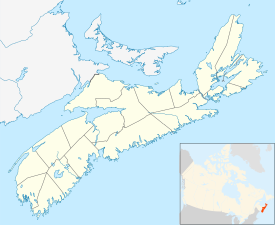Canning, Nova Scotia
| Canning | ||
|---|---|---|
| Village | ||
 |
||
|
||
| Location of Canning, Nova Scotia | ||
| Coordinates: 45°09′28.5″N 64°25′27″W / 45.157917°N 64.42417°WCoordinates: 45°09′28.5″N 64°25′27″W / 45.157917°N 64.42417°W | ||
| Country |
|
|
| Province |
|
|
| County | Kings | |
| Established | 1760 | |
| Government | ||
| • Village Committee | Village of Canning Commission | |
| • MLA | John Lohr (PC) | |
| • MP | Scott Brison (L) | |
| Population (2011) | ||
| • Total | 2,589 | |
| Time zone | AST (UTC-4) | |
| • Summer (DST) | ADT (UTC-3) | |
| Postal code | B0P 1H0 | |
| Area code(s) | 902 | |
| Telephone Exchange | 582 | |
| NTS Map | 021H01 | |
| GNBC Code | CAGBD | |
| Website | canningnovascotia.ca | |
Canning is a village in northeastern Kings County, Nova Scotia located at the crossroads of Route 221 and Route 358.
The area was originally settled by Acadians who were expelled in 1755 during the Acadian Expulsion. After the Acadians, Canning - first called Apple Tree Landing and later Habitant Corner - was settled in 1760 by New England Planters and by the Dutch following World War II. The present name was adopted in honour of British prime minister George Canning.
Though much diminished in importance in recent years, Canning was once a major shipbuilding centre and shipping and rail hub for farmers in Kings County. Canning merchants and farmers founded the Cornwallis Valley Railway which ran from 1889 to 1961, connecting the village to the Dominion Atlantic Railway mainline in Kentville, Nova Scotia. The village suffered three major fires in its history.
The Canadian parliamentarian Sir Frederick William Borden had a home in Canning. A cousin of Sir Robert Borden, Sir Frederick was Minister of Militia prior to the First World War. Canning has a prominent statue to the most famous Canadian casualty of the Second Boer War, Harold Lothrop Borden, a son of Sir Frederick. He died in the Battle of Witpoort (See Battle of Witpoort, South Africa).
Canning was also the home of the famous country singer Wilf Carter. He was made an honorary citizen of Canning, Nova Scotia in 1978. Carter was born in Port Hilford, Nova Scotia, but spend a great deal of his childhood working in and visiting the village and its surrounding farmland.
...
Wikipedia


